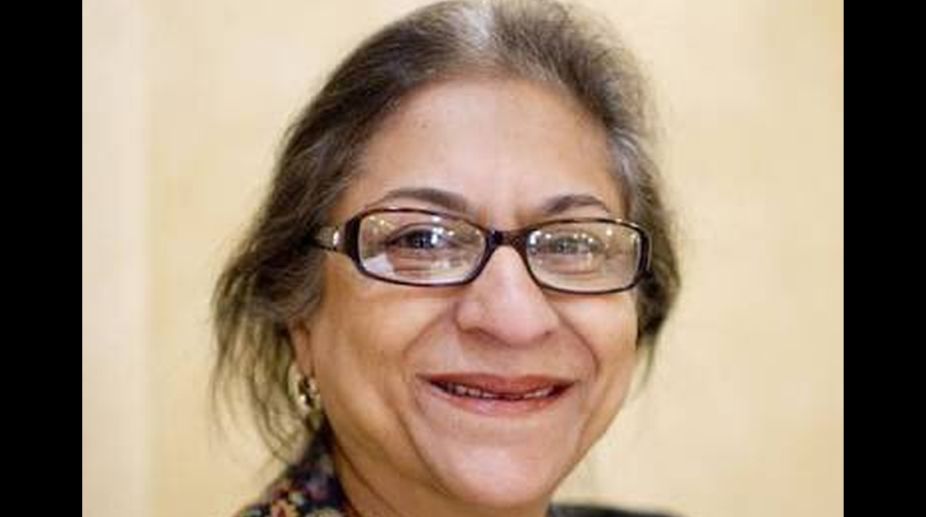Kenya secures funding to tackle climate change challenges
The United Nations (UN)-backed Green Climate Fund (GCF) has approved 50 million US dollars for key projects to bolster climate resilience and promote sustainable development in Kenya.
Asma was known for her outspoken nature and unrelenting pursuit for human rights as well as for remaining undaunted in the face of extreme pressure and opposition.

Asma Jahangir (Photo: Twitter)
Late lawyer and human rights activist Asma Jahangir has been awarded the UN Human Rights Prize for 2018. Her daughter Munizae Jahangir received the prestigious award on behalf of her mother.
The award is given to individuals and organisations in recognition of outstanding achievement in human rights. Asma Jahangir was announced as one of the four winners of the quinquennial prize in October.
Advertisement
Receiving the award for her late mother, Munizae Jahangir dedicated it to Pakistani women and their courage. The ceremony was held at the UN Headquarters in New York on Tuesday.
Advertisement
Other prize winners included women’s rights activist in Tanzania, Rebeca Gyumi; activist for the rights of indigenous Brazilian communities Joenia Wapichana and Ireland’s human rights organisation Front Line Defenders.
Asma became the fourth Pakistani woman to be awarded the UN Human Rights Prize. Before her, Begum Ra’Ana Liaquat Ali Khan (1978), Benazir Bhutto (2008) and Malala Yousufzai (2013) had been accorded the honour.
Asma, who died in February, was known for her outspoken nature and unrelenting pursuit for human rights as well as for remaining undaunted in the face of extreme pressure and opposition.
She is also remembered as a champion of the disenfranchised and for her services towards building a democratic and more inclusive Pakistan.
Jahangir, an outspoken critic of Pakistan’s powerful military establishment, fought against religious extremism and for the rights of oppressed minorities in Pakistan. She died of cardiac arrest at the age of 66 in February.
UN Secretary General Antonio Guterres said that the work of the honourees and that of other human rights defenders around the world is essential for the collective efforts to sustain peace and ensure inclusive sustainable development and respect for human rights for all.
“Often their work is dangerous. We regularly hear of abuses against human rights defenders murder, disappearances, torture, arbitrary imprisonment and other attempts to silence them.
“Yet, these courageous individuals and groups remain committed to shining a light on the dark corners of the globe, wherever human rights violations occur,” he said in his remarks to the General Assembly’s United Nations Prize in the Field of Human Rights award ceremony.
The event commemorated the 70th Anniversary of the Universal Declaration of Human Rights, marked annually on December 10.
Guterres said human rights defenders give voice to the voiceless and shield the powerless against injustice.
“They stand for all rights economic, civil, political, social and cultural. They support the rule of law or work peacefully to change laws so women and girls, indigenous communities, minorities and other marginalised groups may exercise their rights,” he said.
Guterres said they they work to empower people through education, and help to protect other human rights defenders from harassment, intimidation or arrest.
As part of the UN’s activities in observance of Human Rights Day, which coincided with the Declaration’s anniversary, the champions in the field from across the world, convened at the General Assembly Hall to be recognised for their outstanding contributions.
Every five years, the United Nations Prize in the Field of Human Rights is awarded to organisations and individuals which embody excellent activism in defending human rights.
The four winners join a notable group who have been recognised since the Prize was established by the General Assembly in 1966, including prominent figures such as Eleanor Roosevelt, Martin Luther King, Nelson Mandela, Jimmy Carter, Malala Yusafzai and this year’s Nobel Peace Prize winners, Denis Mukwege and Nadia Murad, as well as organisations such as the Amnesty International and the International Committee of the Red Cross.
Marking the 70th anniversary of the Universal Declaration of Human Rights, Espinosa said it was one of the most important contributions that the world body has made to mankind, reflecting the collective aspirations of an international order founded on human dignity and with a view to making the world a better place.
UN High Commissioner for Human Rights Michelle Bachelet said upholding all people’s human rights is the only possible path to peace.
(With inputs from agencies)
Advertisement